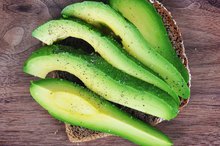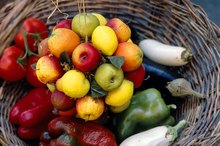What does fact checked mean?
At Healthfully, we strive to deliver objective content that is accurate and up-to-date. Our team periodically reviews articles in order to ensure content quality. The sources cited below consist of evidence from peer-reviewed journals, prominent medical organizations, academic associations, and government data.
The information contained on this site is for informational purposes only, and should not be used as a substitute for the advice of a professional health care provider. Please check with the appropriate physician regarding health questions and concerns. Although we strive to deliver accurate and up-to-date information, no guarantee to that effect is made.
The Coumadin Diet
Coumadin, also known as Warfarin, is an anti-coagulant prescribed to treat and prevent blood clots as well as stroke and heart attacks 2. Certain foods reduce the effectiveness of this blood-thinning medication, so pay attention to what you’re eating. For example, Coumadin has a significant nutrient-drug interaction with vitamin K, which is a crucial player in the blood clotting mechanism.
Interaction
When large amounts of foods high in vitamin K or vitamin K supplements are taken with Coumadin or you alter the amount consumed, Coumadin’s anti-coagulant effectiveness is reduced and the amount of Coumadin needed is increased. On the other hand, greatly lowering your intake may increase the effect. Therefore, vitamin K intake should be consistent in order to maintain the levels of Coumadin within a stable, therapeutic level.
Diet Recommendations
List of Foods That Affect Protime
Learn More
The National Institutes of Health recommends keeping your intake of vitamin K consistent by limiting your intake of foods considered high in vitamin K to no more than 1 serving per day and foods with moderate amounts of vitamin K to no more than 3 servings per day.
Vegetables
You do not need to cut these sources out of your diet; instead, do not significantly change your normal consumption. Eat the same amount every day and from week to week. Other vegetables that are moderately high in vitamin K include:
- asparagus
- broccoli
- avocado
- Brussels sprouts
- cabbage
- cauliflower
- endive
- escarole
- lettuce
- scallion
- purple seaweed
- watercress
Vegetables low in vitamin K are carrots, potatoes, tomatoes, peppers and corn 2.
Beans and Fats
Does Peanut Butter Interact With Warfarin?
Learn More
Chickpeas, lentils, mung beans and soybeans are also high in vitamin K. Avoid eating excessive amounts of these foods, and instead try to maintain a consistent intake. Various oils are also sources of vitamin K, including canola, fish and soybean oils, as are mayonnaise and pistachio nuts 2.
Other Foods
Cranberry juice can increase the effect of Coumadin, leading to bleeding problems 2. Ingesting more than 3 drinks daily of alcohol may increase certain side effects of Coumadin because both alcohol and Coumadin are metabolized in the liver. Consult your doctor for more information on these food-drug interactions.
Dietary Supplements
Consumption of any of these dietary supplements may necessitate a change in the dosage of Coumadin 2. Ensure, Boost and Carnation Instant Breakfast also contain vitamin K. If you are taking these, maintain a consistent intake. Consult your doctor before taking any dietary supplements.
Related Articles
References
- Nutrition Therapy and Pathophysiology; Marica Nelms et al.
- University of Michigan Hospitals and Health Centers: Warfarin/Coumadin
Writer Bio
Danna Biala began writing professionally in 2010. She is completing her master’s degree in applied physiology and nutrition from Columbia University and is currently interning to become a registered dietitian. Biala holds a Bachelor of Science in biochemistry from Brandeis University.









